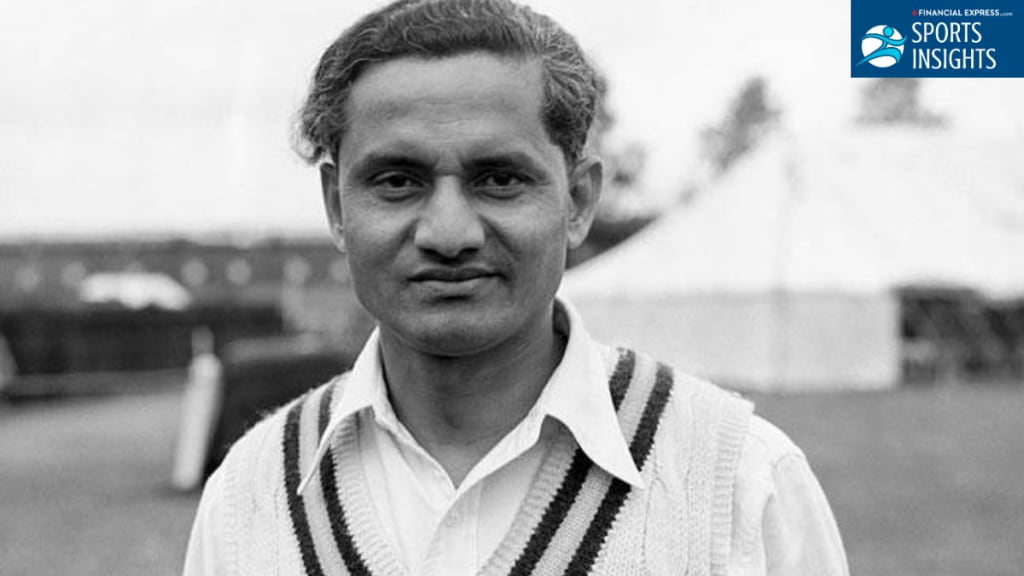The name itself told you everything. Vijay means winning. Hazare means a thousand His name meant victory and thousands, and he lived up to both. He was the first Indian to score a thousand Test runs, then the first to two thousand. But before all that, in 1943, he did something that still makes cricket fans stop and wonder. This is about a triple century in a lost match. About two brothers at the crease where one scored 300 while the other barely crossed 20. About a single morning where one man smashed 122 runs even before lunch.
The Mountain Called 581
The year was 1943. Bombay felt like another planet back then. The Pentangular tournament split teams by religion and community. In the final, the Hindus batted first and built a score so big that other teams would have given up right there. Vijay Merchant stayed not out at 250. Hemu Adhikari made 186. They added 345 runs for the third wicket alone. The final total read 581 for 5. Teams simply didn’t score that much in those days.
One Man Doing Two Jobs
Hazare bowled 51 overs of medium pace in that first innings. Took three of their five wickets. That’s most of them. Then he went out to bat and made 59. But the rest of the team fell apart so badly that the last eight wickets added just 30 runs. They had to follow on. Most players would have been finished after 51 overs of bowling and a fifty. Hazare was just warming up.
14 for 2 Becomes 60 for 5
The second innings started like a bad dream. The score stuck at 14 for 2. Chandu Sarwate and C.S. Nayudu were spinning the ball so much that the Rest batters looked like beginners. Soon it was 60 for 5. The Hindus had already won in their heads. Then Vivek Hazare walked in. He was Vijay’s brother. Not a famous player. Just a man with a bat who happened to share blood with a genius.
The Partnership That Changed Everything
The brothers stayed together till stumps on day three. They added 129 runs. Vivek scored 14 of them. Vijay was 125 not out. Think about that. One man scoring 111 while his partner gets 14. The next morning, something happened that people in Bombay still talk about. Vijay Hazare went crazy in the best way possible. He reached 247 before lunch. He had added 122 runs in one session. His brother was still there, hanging on.
300 Runs Between Brothers, 21 Runs for Vivek
When Vivek finally got out, the brothers had added exactly 300 runs for the sixth wicket. Vivek’s share was 21 runs. Vijay’s share was 279. That is not a partnership. That is one man pulling another up a mountain. The Hindus threw everything at him. Nine bowlers tried. Vinoo Mankad spun the ball. Shute Banerjee tried his tricks. Vijay Merchant himself rolled his arm over. Nothing worked. Hazare had an answer for everything.
309 Out of 387: The King in a Losing Army
The last four batters fell like a pack of cards. They scored 0, 1, 0, and 1 not out. Vijay Hazare kept going. He reached his second triple century. He got out after making 309. The Rest’s final score was 387. Hazare walked in when the score was 14 for 2. There were 19 extras. Do the math. He scored 309 out of 354 runs while he was at the crease. That is 87.3 percent of the runs. Video game players can’t do that. Even in EA Cricket, the computer won’t let you. The Rest still lost by an innings and 61 runs. How many times have you heard of a team losing by an innings despite a triple century?
What the Wise Men Saw in Him
John Arlott watched him later and said something that fits this innings perfectly. “Hazare is never satisfied with his score and is incapable of throwing away his wicket. The century mark, the double-century mark, are only milestones in an unvarying pace of scoring… he is concerned with scores and is developing into a capable machine for making them.” A machine. But a machine with a brother at the other end who could barely score. A machine that bowled 51 overs and still batted like this.
Numbers That Laugh at Modern Gods
Think about this. Hazare’s first-class batting average was 58.38 – better than Gavaskar, Sachin, Dravid, Kohli. He averaged 24.61 with the ball, which beats Shami, Srinath, Kapil, Kumble. War made him wait for his Test debut, but he still got seven hundreds in 30 Tests at 47.65. He even made two hundreds in one Adelaide Test against Lindwall and Miller. He was the first Christian to play Test cricket for India. At age 37, Fred Trueman, the finest fast bowler of that time, said Hazare was “as good a player of fast bowling as there was in th
Story That Never Gets Old
This 1943 innings is not just about runs. It is about carrying your team when everyone else has given up. It is about a brother who stayed while runs came at the other end. It is about bowling 51 overs and still batting for two days. It is about scoring 87 percent of your team’s runs and still losing. Vijay Hazare proved his name right that week. He brought victory to his own bat, even if his team could not share it. This story deserves to be told again and again, not because it ended well, but because one man made it matter anyway.

